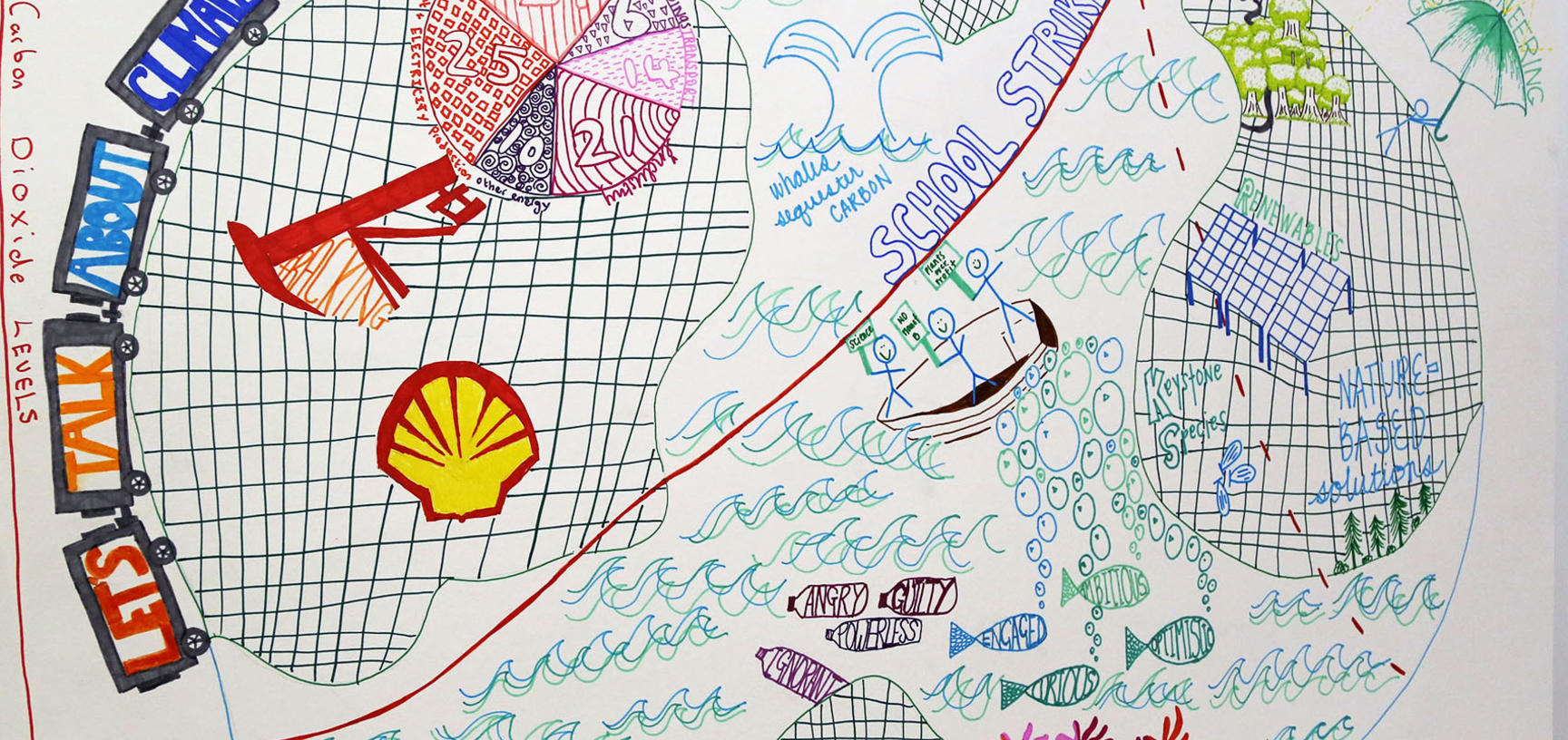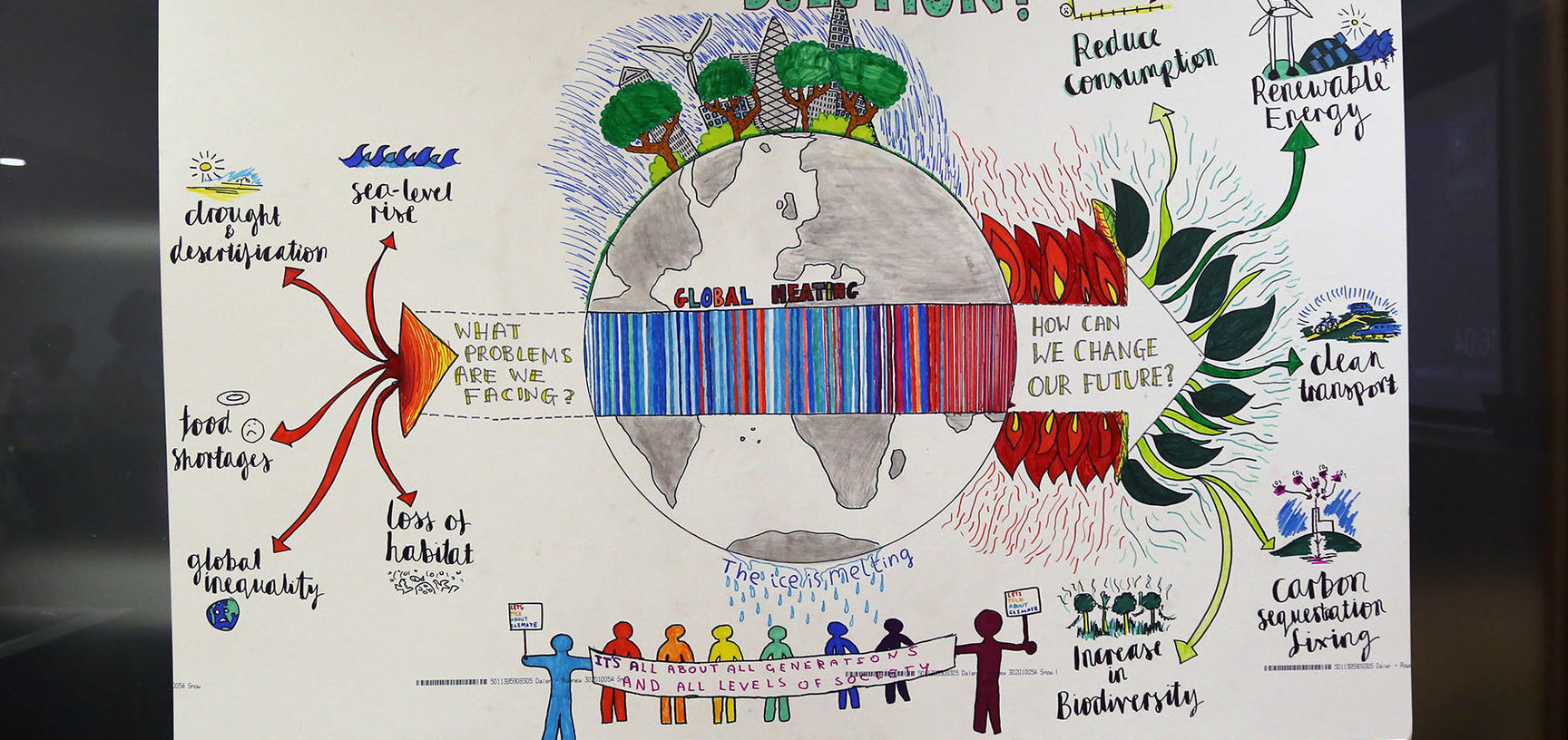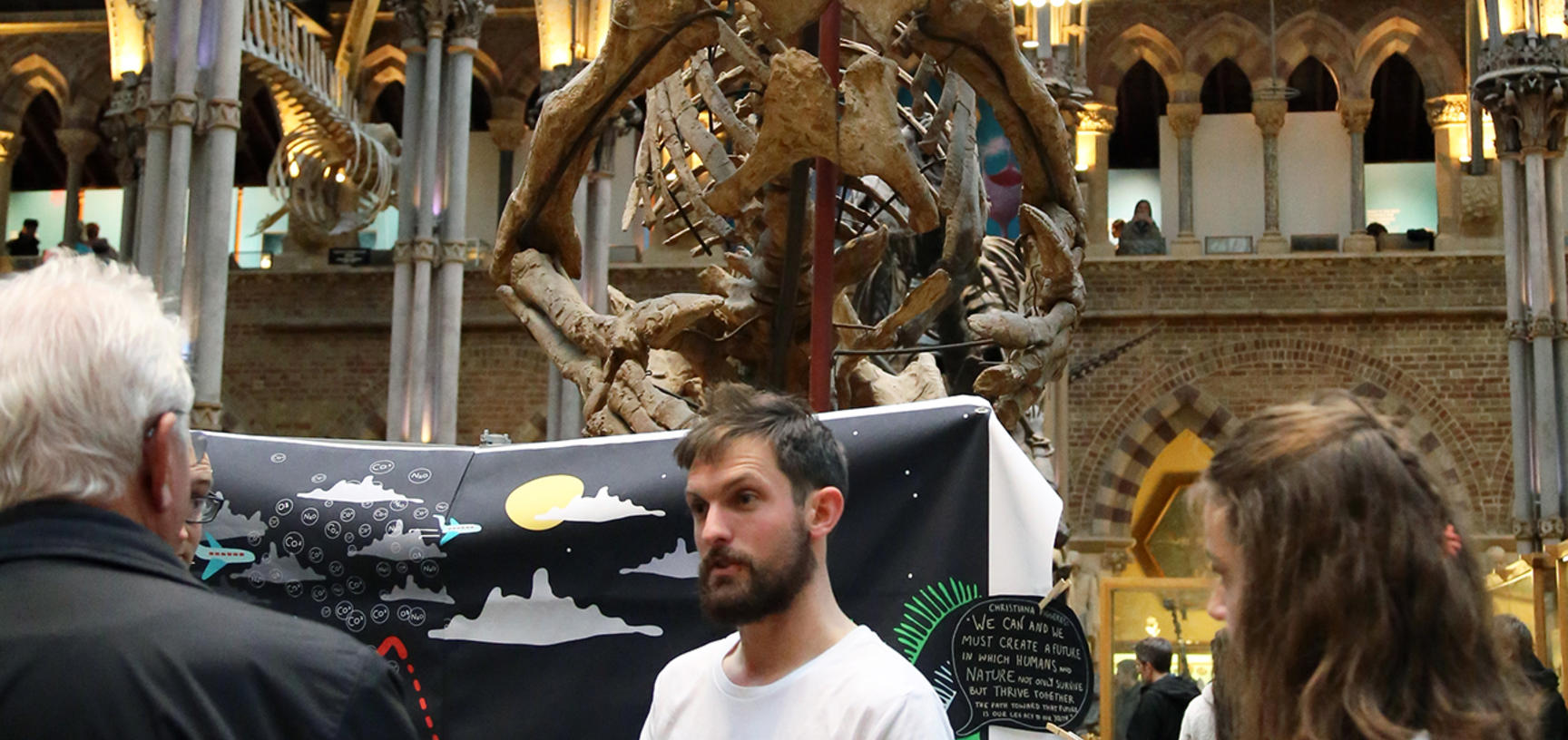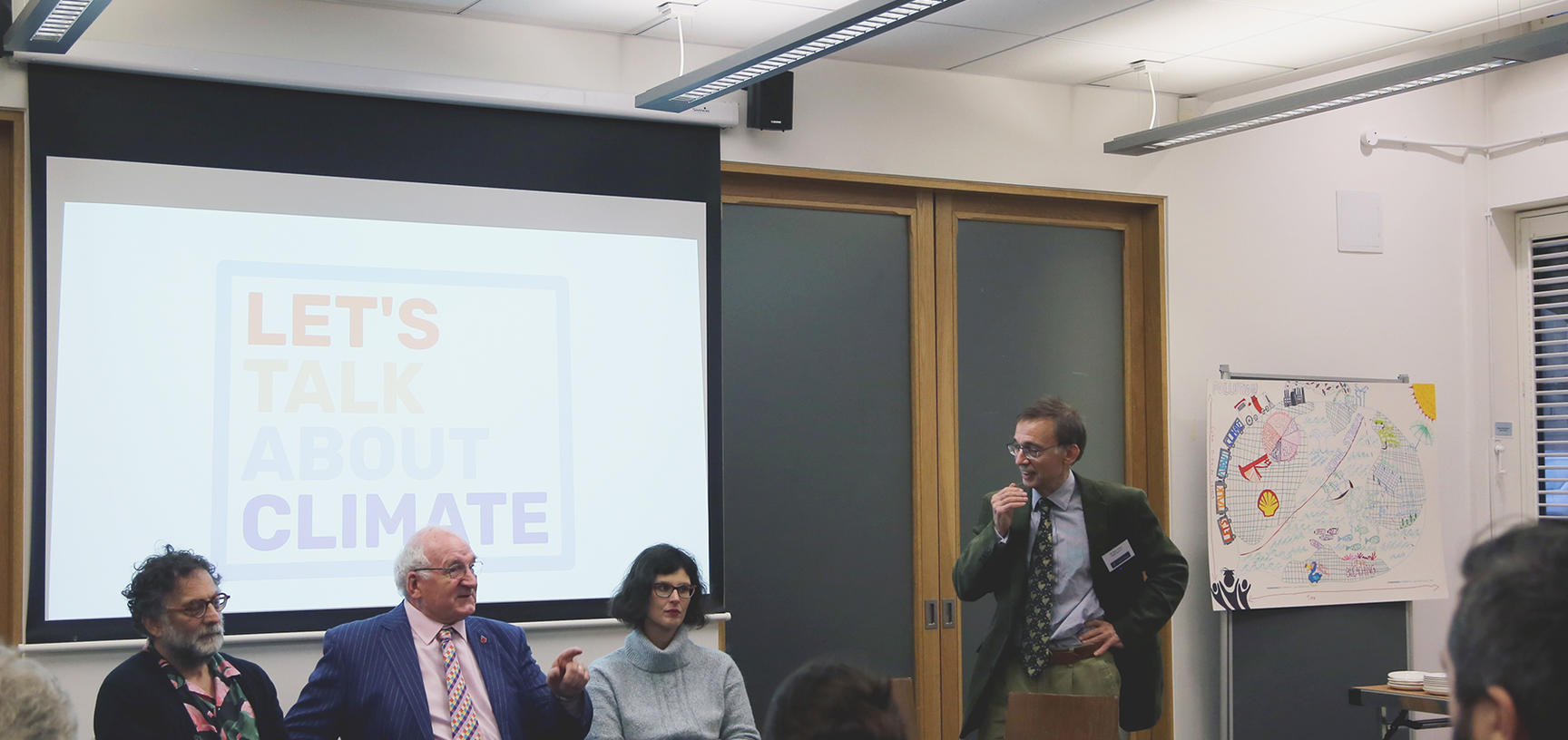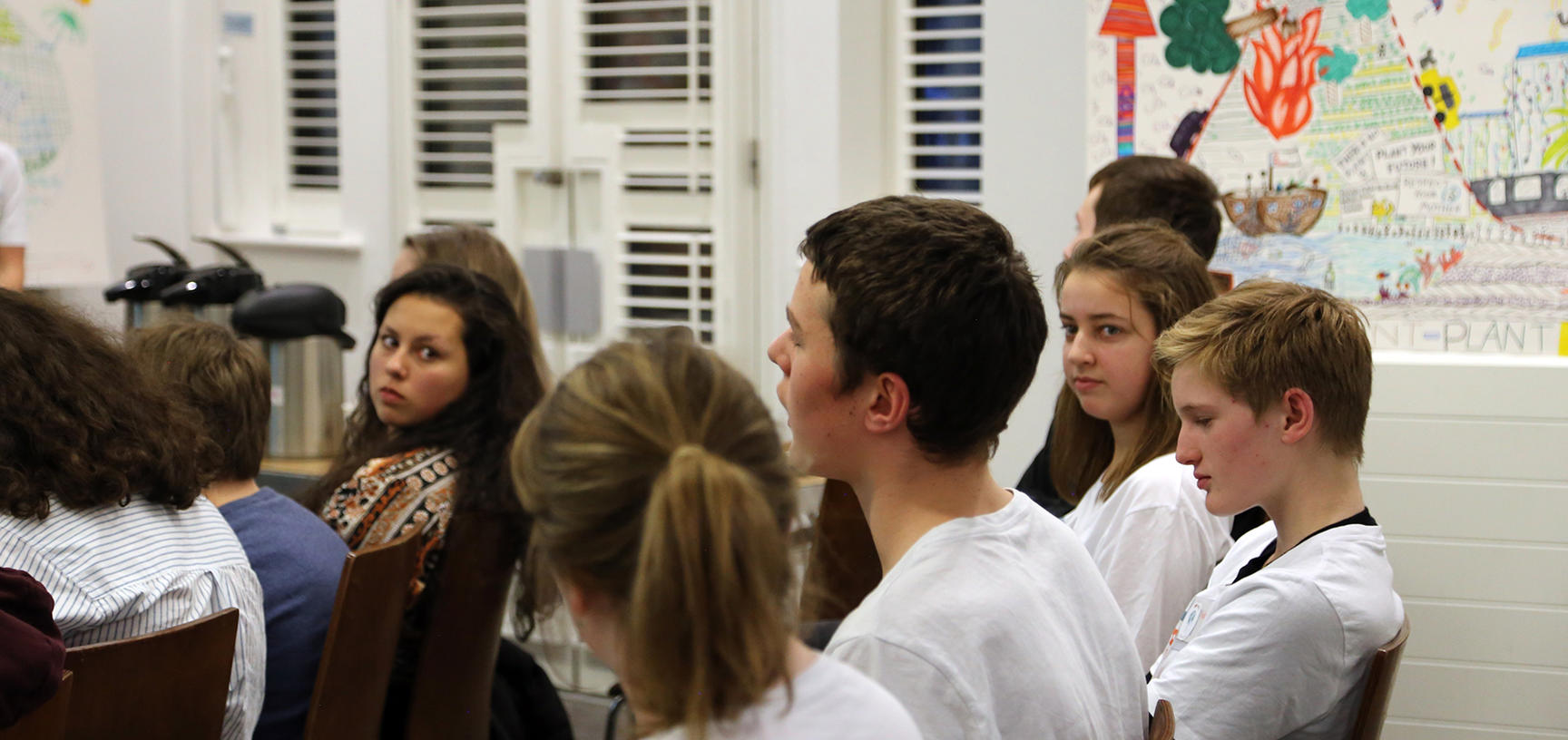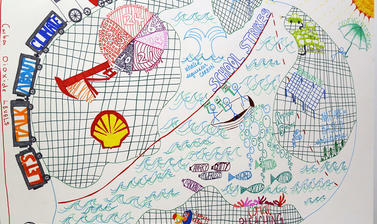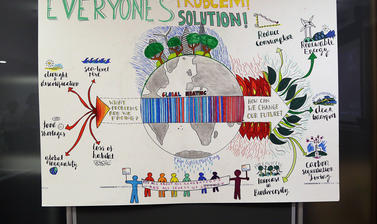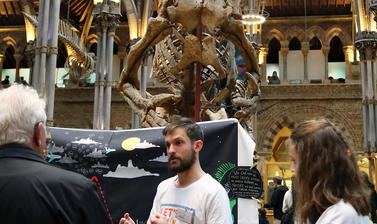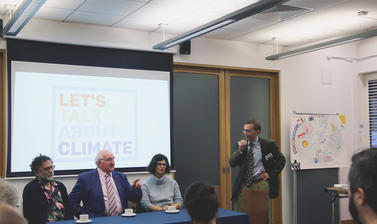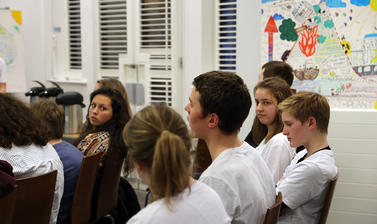Let’s Talk About Climate
Oxford University Museum of Natural History is committed to raising awareness of the climate crisis. We also have a responsibility to support our aware (and often anxious) audiences by providing reliable information and developing necessary skills to raise awareness more broadly.
Let’s Talk About Climate project gave young people aged between 15 and 19 years the chance to review evidence first hand, talk to the experts and respond. Over six interactive workshops, participants learnt about the science of climate change, thought about the how to solve the problem, and worked out how to pass on their own message to influence decisions made at individual, local and national levels.
If you are an educator who would be interested in using the teaching resources that went into this project, please contact Sarah Lloyd, Head of Education: sarah.lloyd@oum.ox.ac.uk.
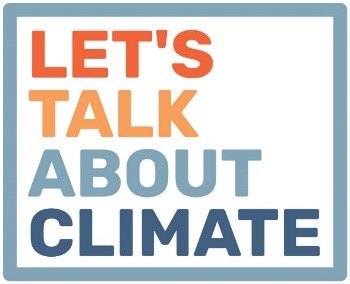
Through the Museum’s links with University departments we were able to draw on academic expertise to explain up to date and evidence based research about a broad range of climate related issues. We were able to use our expertise in public engagement with research to develop a stimulating programme of activities that enabled us to achieve the aims of the programme.
We originally chose to engage with young people between 16 and 19 years old. It was felt that this audience was reliant on a media interpretation of the climate crisis and there was a potential for misinterpretation. There is a danger that this might lead to climate fatigue and an inability to make informed decisions. Our initial aim was to provide clear and accurate information.
During the planning phase of the project youth engagement with the climate crisis increased dramatically. However, despite being relatively well informed and passionate activists our audience lacked confidence in their ability to communicate the sense of urgency to their peers, families and policy makers. Our aims broadened then to include the development and deployment of good communication skills.
The overarching aims to develop knowledge and skills were broken down further. We felt that the project would have been a success if participant were able to:
Demonstrate a clearer understanding of climate issues
Apply knowledge and understanding to their own circumstances
Use clear language and strong arguments to talk to peers, families and policy makers
Set their own climate related goals
Change their own behaviour to reduce their impact on the climate
Engage other people with the climate crisis
Feel optimistic about climate and the future
Feel confident they can ask their own questions
Feel proud of what they have achieved
It also became evident that the age range of the most active young people in Oxford was broader than our target age range of 16 – 19 years. There were a number of 15 year olds taking prominent roles in the organisation of the local youth climate strikes. We therefore extended the age range so that these people could be included.
The programme of events was planned during the summer of 2019 by a team of 5 people and started in September 2019 with 6 interactive workshops. Each workshop had a stand-alone theme. This meant that the format was flexible and participants could join at any point in the programme.
These are the session themes:
- That’s another fine mess you’ve gotten me into - Finding out how we all became so reliant on hydrocarbons
- Have we reached the point of no return? - Exploring the evidence that human activity is affecting people and places, both close to home and further afield.
- Let’s science the s*** out of this! - Discussing how we might use technology to produce enough clean energy to steer us away from a point of no return.
- If I ruled the World - Understanding the balance between science and economics when making decisions about emissions.
- Biodiversity is key – Finding out how resilient ecosystems can help us adapt to a rapidly changing climate.
- Blame game or game changer? Spreading the CC word - Learning how to communicate an urgency about the climate crisis.
Each workshop took place on a Saturday morning from 10am and 1pm and consisted of a number of activities such as talks, discussions, practical and social activities.
The final outreach event took place in the Museum in November 2019. Participants put Let’s Talk About Climate to the test by presenting their climate message to friends and families visiting the Museum. This was followed by question and answer session with local policy makers and MPs.
A core group of approximately 20 young people attended every workshop. A further 37 people came to the occasional workshop. Each workshop was led at least one academic and one public engagement professional and facilitated by between 3 and 6 early career researchers.
A number of teachers from schools outside Oxfordshire expressed an interest in the programme but felt that it was unlikely that their students would be able to travel to Oxford each week. At fairly short notice we took elements of the programme and devised a day of activities for A-level geography students. This day was attended by more than 160 students and 16 teachers from 7 schools. The activities and talks were well received and teachers were keen to have digital access to the resources to use with other classes back at school.
At the end of the eight-week programme we asked participants to give each of the following comments a score out of 5
5 = strongly agree 4 = agree 3 = neither agree or disagree 2 = disagree 1 = strongly disagree
(Nine people completed this task. The average score is shown at the end of each statement.)
I am able to demonstrate a clearer understanding of climate issues (4.4)
I am able to apply knowledge and understanding to my own circumstances (4.3)
I am able to use clear language and strong arguments to talk to peers, families and policy makers (4.1)
I am able to set my own climate related goals (4.1)
I have changed my behaviour to reduce my impact on the climate (4.0)
I have engaged other people with climate issues (4.4)
I have developed a sense of urgency to do something (4.6)
I am optimistic about climate and the future? (3.9)
I felt confident that I could ask questions (4.3)
I felt proud of what I achieved (4.6)
On reflection there were many successful outcomes to the Let’s Talk About Climate (LTAC) project. Many of these were due to meticulous planning and the help and support of such a wide range of talented and inspirational people. Some were due in part to good fortune.
The programme was launched at a time when youth participate in climate crisis action was at its peak. Many organisations were planning a response to this growing demand for support and by chance, we were ready to respond. The final event was also well timed. We invited local figures to meet the LTAC participants in the same week that a general election was announced, and just ahead of an election campaign. At the final outreach event two local MPs, a county councillor and the Lord Mayor of Oxford made up a responsive and highly engaging panel.
Our participants asked why it is taking such a long time for policy makers to act on the climate crisis. They also wanted to know what incentives governments could offer those facing deprivation to engage with climate related issues.
Since the start of the project, other organisations were keen to hear about LTAC. The project was discussed as an example of good practice at the 2019 National Museums Association conference and GLAM Research and PER showcase and highlighted in a Museums Journal article. (November 2019)
The LTAC planning team double in size from two to four people. We were supported by one intern, five additional speakers, nine paid facilitators and nine volunteers. As a bigger team we were able to make more connections with organisations inside and outside of the University. This helped us plan for the projects legacy and provide a meaningful ‘next step’ for the participants.
The co-production of the programme with such a large team and participants was challenging. It was not always possible to capture every successful outcome and share as publically as, in hindsight we would have liked. However the advantages of the approach outweighed the disadvantages.
Let’s Talk About Climate has been an innovative, inspiring and rewarding project and we are looking to build on its successful outcomes over the next year.
Parent feedback
‘Thank you so much for a brilliant series of workshops. My daughter has hugely enjoyed and benefited from it. She is also now greatly involved with climate change and environmental activities at her school. As well as the quality of the taught and shared learning, she has been aware that the course organisers have invested in her and the other participants. What may ”just” be pizza and a bus pass has had a powerful impact and we all really appreciate it.’
Facilitator feedback
‘The programme has been such a cool initiative, and it was so nice to see everyone getting really involved in the session. It must have been a really positive thing for all of the young people that took part in the series, and just what is needed to create a space to inform young people about climate science and how we can tackle climate change. I think understanding the science behind the problem and all of the complexities involved is really empowering, especially when faced with something of the magnitude of climate change.’
Teacher feedback
‘The students and I thoroughly enjoyed the day and found that it complemented the work that we have been doing in Geography and also allowed the girls to discuss and feel more confident around the topic of climate change and give them a huge range of statistics to use also. Thank you again for a fantastic day which was enjoyed by all!’
Participant feedback
‘My eyes have been opened and I feel much more informed’
‘I feel more optimistic and confident about climate action’
‘This has been really good for deepening my understanding’
‘Thank you I’ve learnt a lot and feel more informed as to what I can do’
‘I am going to speak out more (publicly) about climate change’
‘I am going to help enforce eco-friendly policy change in my school’
‘I am going to make sure friends and family understand the dangers and solutions to climate change’
‘We are the people who can help the world change’
‘Let’s do it again!’
The LTAC team:
Ken Amor Department of Earth Sciences
Sarah Lloyd Oxford University Museum of Natural History
Cecile Girardin Oxford Biodiversity Network
Luke Jackson Nuffield College
Hayley Knights Department of Plant Sciences
Thanks to:
Stuart Robinson Department of Earth Sciences
Aidong Yang Department of Engineering Science
Ruta Karolyte Department of Earth Sciences
Neven Fuckar Environmental Change Institute
Myles Allen Environmental Change Institute
Brooke Johnson Department of Earth Sciences
Laura Di Giacomo
Thomas Hornigold Environmental Change Institute
Matt Sutton
Kirsty Harrington Department of Earth Sciences
Jasper Verschuur School of Geography
Chris Cook OXIS Energy
Emily Warner Department of Plant Sciences
Metta Pratt
Annie Welden School of Geography
Isobel Walker Department of Earth Sciences
Kim Polgreen Leadership in Global Change
Michaela Livingstone-Banks Mathematical, Physical and Life Sciences Division
This is a PER lab project funded by the Mathematical, Physical and Life Sciences Division




